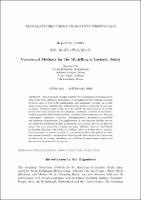Abstract
This workshop brought together two communities working on the same topic from different perspectives. It strengthened the exchange of ideas between experts from both mathematics and mechanics working on a wide range of questions related to the understanding and the prediction of processes in solids. Common tools in the analysis include the development of models within the broad framework of continuum mechanics, calculus of variations, nonlinear partial differential equations, nonlinear functional analysis, Gamma convergence, dimension reduction, homogenization, discretization methods and numerical simulations. The applications of these theories include but are not limited to nonlinear models in plasticity, microscopic theories at different scales, the role of pattern forming processes, effective theories, and effects in singular structures like blisters or folding patterns in thin sheets, passage from atomistic or discrete models to continuum models, interaction of scales and passage from the consideration of one specific time step to the continuous evolution of the system, including the evolution of appropriate measures of the internal structure of the system.

